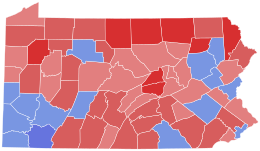
The 1968 United States Senate elections were elections for the United States Senate. Held on November 5, the 34 seats of Class 3 were contested in regular elections. They coincided with the presidential election of the same year. The Republicans picked up five net seats in the Senate. This saw Republicans win a Senate seat in Florida for the first time since Reconstruction.

The 1964 United States Senate elections were held on November 3. The 33 seats of Class 1 were contested in regular elections. Special elections were also held to fill vacancies. They coincided with the election of President Lyndon B. Johnson by an overwhelming majority, to a full term. His Democratic Party picked up a net two seats from the Republicans. As of 2023, this was the last time either party has had a two-thirds majority in the Senate, which allowed the Senate Democrats to override a veto, propose constitutional amendments, or convict and expel certain officials without any votes from Senate Republicans. However, internal divisions would have prevented the Democrats from having done so. The Senate election cycle coincided with Democratic gains in the House in the same year.

The 1962 United States Senate elections was an election for the United States Senate. Held on November 6, the 34 seats of Class 3 were contested in regular elections. Special elections were also held to fill vacancies. They occurred in the middle of President John F. Kennedy's term. His Democratic Party made a net gain of four seats from the Republicans, increasing their control of the Senate to 68–32. However, this was reduced to 67–33 between the election and the next Congress, as on November 18, 1962, Democrat Dennis Chávez, who was not up for election that year, died. He was replaced on November 30, 1962, by Republican appointee Edwin L. Mechem. Additionally, Democrat Strom Thurmond became a Republican in 1964, further reducing Democrats to 66–34. This was the first time since 1932 that Democrats gained seats in this class of Senators.

The 1960 United States Senate elections coincided with the election of John F. Kennedy as president on November 8, 1960. The 33 seats of Class 2 were contested in regular elections. A special election was also held on June 28, 1960, for a mid-term vacancy in North Dakota where Democrats flipped a seat to expand their majority to 66–34. As Majority Leader Lyndon Johnson was elected Vice President, Mike Mansfield became the new majority leader.
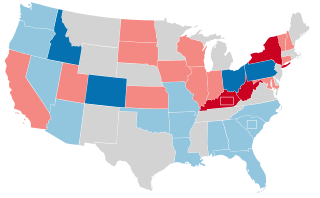
The 1956 United States Senate elections were elections for the United States Senate that coincided with the re-election of President Dwight D. Eisenhower. The 32 seats of Class 3 were contested in regular elections, and three special elections were held to fill vacancies. Although Democrats gained two seats in regular elections, the Republicans gained two seats in special elections, leaving the party balance of the chamber unchanged.

The 1948 United States Senate elections were held concurrently with the election of Democratic President Harry S. Truman for a full term. The 32 seats of Class 2 were contested in regular elections, and one special election was held to fill a vacancy. Truman campaigned against an "obstructionist" Congress that had blocked many of his initiatives, and additionally, the U.S. economy recovered from the postwar recession of 1946–1947 by election day. Thus, Truman was rewarded with a Democratic gain of nine seats in the Senate, enough to give them control of the chamber. This was the last time until 2020 that Democrats flipped a chamber of Congress in a presidential election cycle.

The 1944 United States Senate elections coincided with the re-election of Franklin D. Roosevelt to his fourth term as president. The 32 seats of Class 3 were contested in regular elections, and three special elections were held to fill vacancies.

The 2000 United States House of Representatives elections were held on November 7, 2000, to elect U.S. Representatives to serve in the 107th United States Congress. They coincided with the election of George W. Bush as President of the United States. The Republican Party won 221 seats, while the Democratic Party won 212 and independents won two.

The 1914 United States Senate elections were held on November 3, 1914. These were the first regularly scheduled elections held following the ratification of the Seventeenth Amendment to the United States Constitution in 1913, which required that all seats up for election be popularly elected, rather than chosen by their state legislatures. Thus, it was the first time that elections were generally scheduled on Election Day to coincide with the U.S. House elections. The 32 seats of Class 3 were contested in regular elections in 1914. Special elections were also held to fill vacancies. These elections occurred in the middle of Democratic President Woodrow Wilson's first term.

Francis John Myers was an American teacher, lawyer, and Democratic Party politician. He represented most of West Philadelphia and Southwest Philadelphia in the United States House of Representatives from 1939 to 1945 and represented Pennsylvania in the United States Senate for one term from 1945 to 1951. He was Senate Majority Whip from 1949 to 1951.
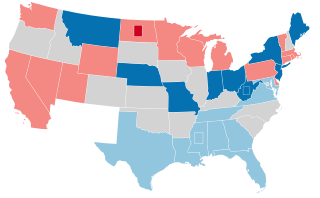
The 1910–11 United States Senate election were held on various dates in various states. As these U.S. Senate elections were prior to the ratification of the Seventeenth Amendment in 1913, senators were primarily chosen by state legislatures. Senators were elected over a wide range of time throughout 1910 and 1911, and a seat may have been filled months late or remained vacant due to legislative deadlock. However, some states had already begun direct elections during this time. Oregon pioneered direct election and experimented with different measures over several years until it succeeded in 1907. Soon after, Nebraska followed suit and laid the foundation for other states to adopt measures reflecting the people's will. By 1912, as many as 29 states elected senators either as nominees of their party's primary or in conjunction with a general election.

The 1876–77 United States Senate elections were held on various dates in various states, coinciding with Rutherford B. Hayes's narrow election as president. As these U.S. Senate elections were prior to the ratification of the Seventeenth Amendment in 1913, senators were chosen by state legislatures. Senators were elected over a wide range of time throughout 1876 and 1877, and a seat may have been filled months late or remained vacant due to legislative deadlock. In these elections, terms were up for the senators in Class 2.

The 1890–91 United States Senate elections were held on various dates in various states. As these U.S. Senate elections were prior to the ratification of the Seventeenth Amendment in 1913, senators were chosen by state legislatures. Senators were elected over a wide range of time throughout 1890 and 1891, and a seat may have been filled months late or remained vacant due to legislative deadlock. In these elections, terms were up for the senators in Class 3.

The 1892–93 United States Senate elections were held on various dates in various states, coinciding with former Democratic President Grover Cleveland's return to power. As these U.S. Senate elections were prior to the ratification of the Seventeenth Amendment in 1913, senators were chosen by state legislatures. Senators were elected over a wide range of time throughout 1892 and 1893, and a seat may have been filled months late or remained vacant due to legislative deadlock. In these elections, terms were up for the senators in Class 1.
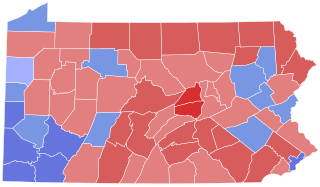
The 1962 United States Senate election in Pennsylvania was held on November 6, 1962. Incumbent Democratic U.S. Senator Joseph S. Clark, Jr. successfully sought re-election to another term, defeating Republican nominee James E. Van Zandt.

The 1956 United States Senate election in Pennsylvania was held on November 6, 1956. Incumbent Republican U.S. Senator James H. Duff sought re-election to another term, but was defeated by the Democratic nominee, Joseph S. Clark, Jr.
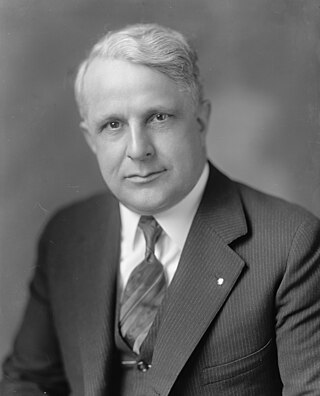
The 1930 United States Senate special election in Pennsylvania was held on November 4, 1930. Joseph R. Grundy, incumbent Republican appointed to fill the vacancy created by the unseating of William Scott Vare, was defeated for re-nomination. The Republican nominee, James J. Davis, defeated Democratic nominee Sedgwick Kistler to win the election.

The 1950 United States Senate election in Pennsylvania was held on November 7, 1950. Incumbent Democratic U.S. Senator Francis J. Myers sought re-election, but was defeated by Republican nominee James H. Duff. As of 2021, this is the last time that Lycoming County voted Democratic in a Senate election.
A Massachusetts general election was held on November 2, 1954 in the Commonwealth of Massachusetts.
The 1948 Massachusetts general election was held on November 2, 1948, throughout Massachusetts. Primary elections took place on September 14.
